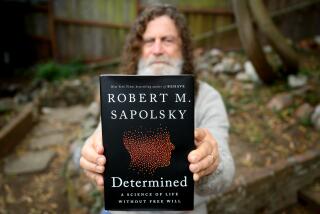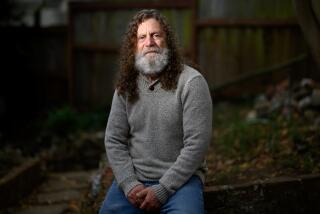THE ORIGINS OF VIRTUE: Human Instincts and the Evolution of Cooperation.<i> By Matt Ridley</i> . <i> Viking: 296 pp., $24.95</i>
If you think of people as machines made up of nothing more than atoms and quarks, it’s hard to explain why people are nice. That’s the problem that worries Matt Ridley. And what’s worse, if people aren’t naturally nice, the political complications are nasty.
Take Thomas Hobbes, for example. Living through the chaos and insurrection of the English civil war, this 17th century materialist denied that we have any inborn tendency to be socially responsible. He claimed that everyone is motivated by selfish concerns of power or fear, so that without enforced rules, the human condition is a “war of everyone against everyone.” Therefore, a strong central authority is the only route to peace. You might think that, in a time of strife, this wouldn’t be such a far-fetched view, but in fact Hobbes’ harsh ideas shocked his contemporaries. Yet his claim that a central authority is the only trustworthy route to peace was never effectively rebutted, and repressive social policies were justified in his name for the next 300 years. As Ridley would have it, the Hobbesian search for a perfect society ended in the gas chambers of Auschwitz.
Based purely on its lurid implications, this “people are nasty” view deserves to have died out a long time ago. But Hobbes’ essential concept, that humans are self-interested machines, thrives all around us in Western academia. Most important, it is the central theme of both economics and evolutionary biology. In the hearts of these disciplines, the uncomfortable notion is that virtue is illusory. At base, we are all emotional Scrooges, doling out charity to others only to serve our own self-interests, never for the sake of joy. Self-interest theory (from economics) and selfish-gene theory (from biology) suggest that the milk of human kindness, when carefully tasted, is sour with cynicism. It implies that even when people act in apparently kindly ways, they are actually calculating and devious.
All this is rather disturbing for people who want to understand the deep roots of human motivation but don’t like Hobbesian politics. So what’s a poor liberal to do? One escape is denial, a route trumpeted by biologist Steven Jay Gould. Full of good intentions, Gould is so alarmed by the prospect of being forced to view humans as fundamentally selfish that he claims special exemption from evolutionary rules. Human emotions, he suggests, simply aren’t subject to the same evolutionary laws that apply to the rest of the natural world. Maybe we’re too clever, or . . . ahem . . . well, something like that anyway. Yes, well. . . . By placing the human species on a special pedestal, Gould and his ilk follow a fine tradition of romantic thinkers. But this unique escape from evolutionary rules is a luxury few evolutionists allow themselves.
So, are people basically nice or nasty? In “The Origins of Virtue,” Ridley argues for a new answer to this old question. First, he offers the familiar background. If you say we’re nice until corrupted, you join Jean-Jacques Rousseau and Karl Marx in having faith in a society based on inherent human goodness. If you think we’re nasty unless reformed, you’re with Hobbes and Machiavelli and looking for a strong dose of social authority. Either way, you’ve got problems; there’s not much to choose between Marx and Machiavelli. But Ridley is out to challenge the old dichotomy. He wants to have it both ways, that we’re both nasty and nice. We’re nasty at one level (the unconscious genetically driven self); but in the real world, we’re nice, genuinely pleasant. And this gives him new political ideas. He presents himself as a modern-day Rousseau in Hobbesian garb.
Special pleading certainly doesn’t satisfy Ridley. Determined to show that gentle politics can coexist with intellectual honesty, he escapes the Hobbesian vortex by arguing that deep self-interest creates not cynical manipulators (as most would have it), but genuinely nice people. Armed with a doctorate in zoology from Oxford and several years of writing for the Economist, Ridley is well-schooled for the effort. Evolutionary psychology was named as a subfield within the last decade, and this is one of the first books to present it in readable form. But the Darwinian approach to economics is in its infancy, so Ridley’s journalism is put to good use here, linking economic theory to natural selection in the most novel parts of the book.
He starts from a solid base with an unblinking look at evolutionary biology. Unlike the Gould-style romantics, he finds no escape from the arid conclusion that the products of natural selection, from bacteria to Bill Clinton, are machines strategizing for their own good. One might almost say he revels in the idea, so colorful and apt are his descriptions of evolutionary games--whether he’s writing about bats and monkeys reciprocating in strategic give-and-take or genes uniting in a chromosomal parliament. But all his enthusiasm for biology merely exacerbates the problem. If life is a competitive struggle, why is there so much cooperation about? The puzzle is that in a world of selfish individuals, nice guys are expected to finish last; charitable acts should lose out to cheats.
After delving into a mire of technical studies, Ridley emerges clutching an answer. We have kindly feelings, he says, because they serve natural selection’s stark purpose. Friendly social emotions are mental devices for guaranteeing commitment. Just as hunger bids us eat when we might otherwise foolishly forget to do so, so generosity takes us into helpful relationships that our rational brains might have thought unpromising. Though biologists and economists have toyed with this answer for decades, Ridley’s deft use of game theory and strange puzzles played out by academic economists give his argument unusual strength. Trust and trade, he says, are keys to human evolution. The argument is easy to accept.
Once bolstered by the conviction that gene machines benefit from social emotions, Ridley moves quickly to his soapbox. Conservationists, he concludes abruptly, are making a mistake by buying (or seizing) land and giving it to a Hobbesian leviathan, the government; the lack of private interest exposes it to erosion at the hands of a disinterested public. And by the way, less government will create more trust, and hence more economic success, so can we please get the government off our backs?
If the fit between Ridley’s scientific conclusions and his gently libertarian politics seems too good to be true, his upbeat outlook is to blame. He knows that humans share emotions with other primates, not only kindness but also hate. Fully aware of the possibilities for tribalism, he nevertheless ends his essay so entranced with the evolution of kindly instincts that the negative social emotions lie forgotten, as if anger and exploitation thrive only in a society misconceived on Hobbesian principles. Would it were so.
But don’t let this put you off. The great merit of “The Origins of Virtue” lies not in its politics nor even in its fine biology, but in its taking seriously evolution’s impact on the social sciences. It is an early, excellent example of what will surely be a wave of such efforts. In a world with the promise not just of human cloning but of solid evidence of our natural history, we need new, more confident guideposts to replace old spiritual myths. Without them, we will be bogged in fearful attitudes such as were felt by George Bernard Shaw, who wrote about evolution rather as some of today’s romantics do: “When its whole significance dawns upon you, your heart sinks into a heap of sand within you. There is a hideous fatalism about it, a ghastly and damnable reduction of beauty and intelligence, of strength and purpose, of honour and aspiration.” Shaw’s dramatic worry is understandable because a materialist view is truly difficult medicine. It requires serious thought to reconcile it with our fragile self-image of being more than dust.
So the argument that selfish genes don’t mean selfish individuals is important. Matt Ridley’s call for more attention to the emotions is a nice step on the road to a more complete theory. “The Origins of Virtue” heralds an uplifting of the stark visions of deep theory into a stronger intellectual basis for the sunny side of life.






